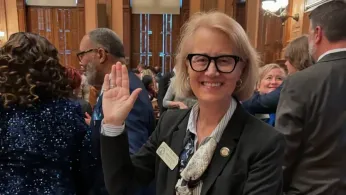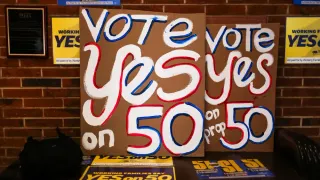
4 hours ago
Southern Firsts and Fierce Futures: Karla Drenner’s 25 Years of Queer Political Power
READ TIME: 3 MIN.
If you’re queer in the American South, you know the landscape is rarely easy. But sometimes, someone strides onto the stage and redraws the entire map. That’s what happened in 2000, when Karla Drenner, a lesbian academic from Avondale Estates, became the first openly LGBTQ+ person elected to any legislative body in the region, ushering in a new era for Georgia—and for the South at large .
Avondale Estates, Drenner’s home turf, boasts the highest density of gay couples in Georgia according to the 2010 census—a statistic that seems almost poetic, given her decades-long commitment to queer visibility and advocacy . But Drenner’s story isn’t just about breaking records—it’s about breaking silence.
In her interview with The Advocate, Drenner reflects candidly on the barriers she faced: “They said I wasn’t worthy of being known,” she shares, her words echoing the persistent erasure that so many LGBTQ+ people have felt—not just in politics, but in daily life . That erasure—being told your story, your love, your life don’t count—has fueled Drenner’s work for a quarter century.
Her induction in 2000 wasn’t a fluke. Drenner’s campaign was a masterclass in grassroots queer resilience: “I walked my entire district three times and talked to over 3,500 people,” she recalls. “I learned that people really want you to listen to them; they want to know that you care about what they have to say” . If you ever doubted the power of direct action—take notes.
Drenner’s career has been defined by her commitment to the issues that matter most to marginalized communities. She’s sponsored bills commemorating the 50th anniversary of the Stonewall riots, pushed for Genocide Prevention and Awareness Month, and backed the creation of a Gender Parity Task Force . These aren’t just ceremonial gestures—they’re part of a broader strategy to weave queer history and values into the fabric of Georgia law.
But Drenner also knows the work is far from finished. “I mean, you can get married, but you can’t go to work and feel safe because you’re allowed to be harassed and demeaned and demoralized from 8 to 5. That’s not right,” she’s said, highlighting the urgent need for workplace protections and anti-discrimination statutes that go beyond marriage equality .
It’s hard to overstate the impact Drenner’s election had. Before her, Southern legislatures were practically blank slates for out LGBTQ+ representation—her win marked a seismic shift, paving the way for a new generation of queer lawmakers . Today, Georgia’s LGBTQ+ caucus is among the most diverse in the U.S., a testament to the doors Drenner kicked open.
Her political longevity is equally legendary. After over 50 bills signed into law and more than 30 awards for public service, Drenner is still chairing committees and mentoring the next wave of queer talent . She’s the longest-serving LGBTQ+ legislator in the region, and she’s held her seat for 25 years—often running unopposed, a feat in itself .
Drenner isn’t just a political figure—she’s a multidimensional powerhouse. With advanced degrees in health physics, environmental science, business administration, public policy, and occupational safety, she brings an academic rigor to every legislative fight . She’s currently a professor at Purdue University Global, educating the next generation of public servants .
Her life as a mother and community member grounds her politics in real-world stakes—a reminder that queer leadership is never just about the individual, but the networks of care and solidarity that sustain us.
Drenner’s story is, at its core, a masterclass in the magic of “showing up.” Whether it’s thanking the gay community for support during tough re-election battles or fighting for rights that still aren’t guaranteed, Drenner’s legacy is about visibility, persistence, and refusing to be erased .
“Every time I walk into the legislature, I feel the weight and the hope of those who came before—and those who are still waiting for their turn,” Drenner told The Advocate, capturing the emotional landscape of queer leadership in a single sentence .
In an era where attacks on LGBTQ+ rights continue to spike, the endurance of leaders like Drenner is more than inspiring—it’s essential. Her willingness to “fight again for our rights as a community” is a rallying cry for queer Southerners (and allies everywhere) to keep pushing, keep running, and keep showing up .
As Georgia heads into another crucial election cycle, with fresh faces and old challenges, Drenner’s example is a living reminder: Representation is resistance. Visibility is victory. And every time one of us steps into the public eye, we widen the path for those who will follow.
So here’s to Karla Drenner—trailblazer, professor, mom, and, above all, a queer Southern survivor who’s still fighting for the future.






